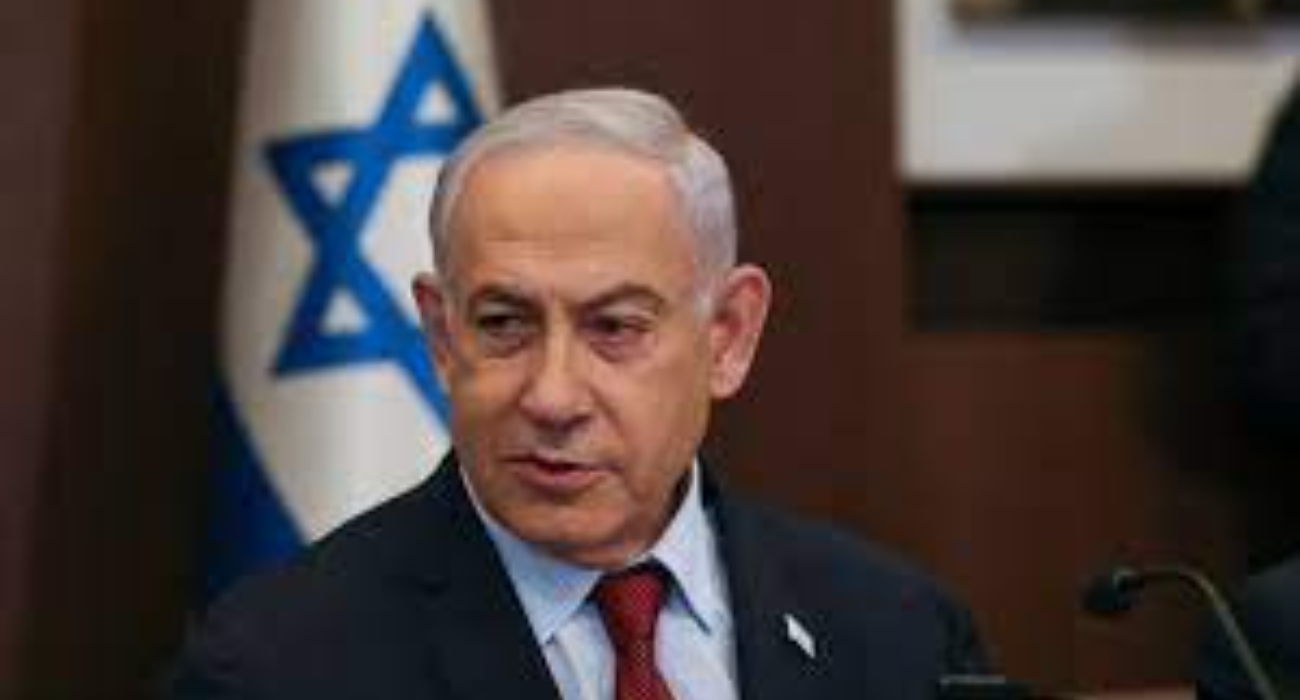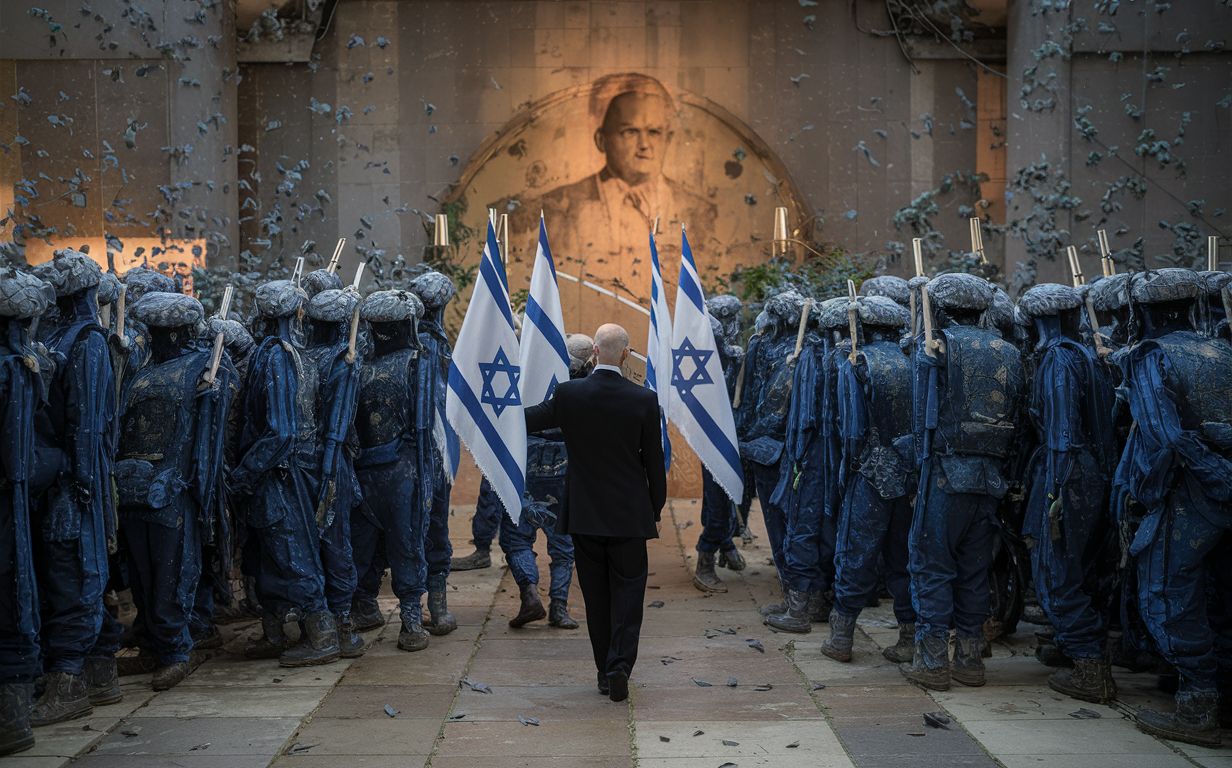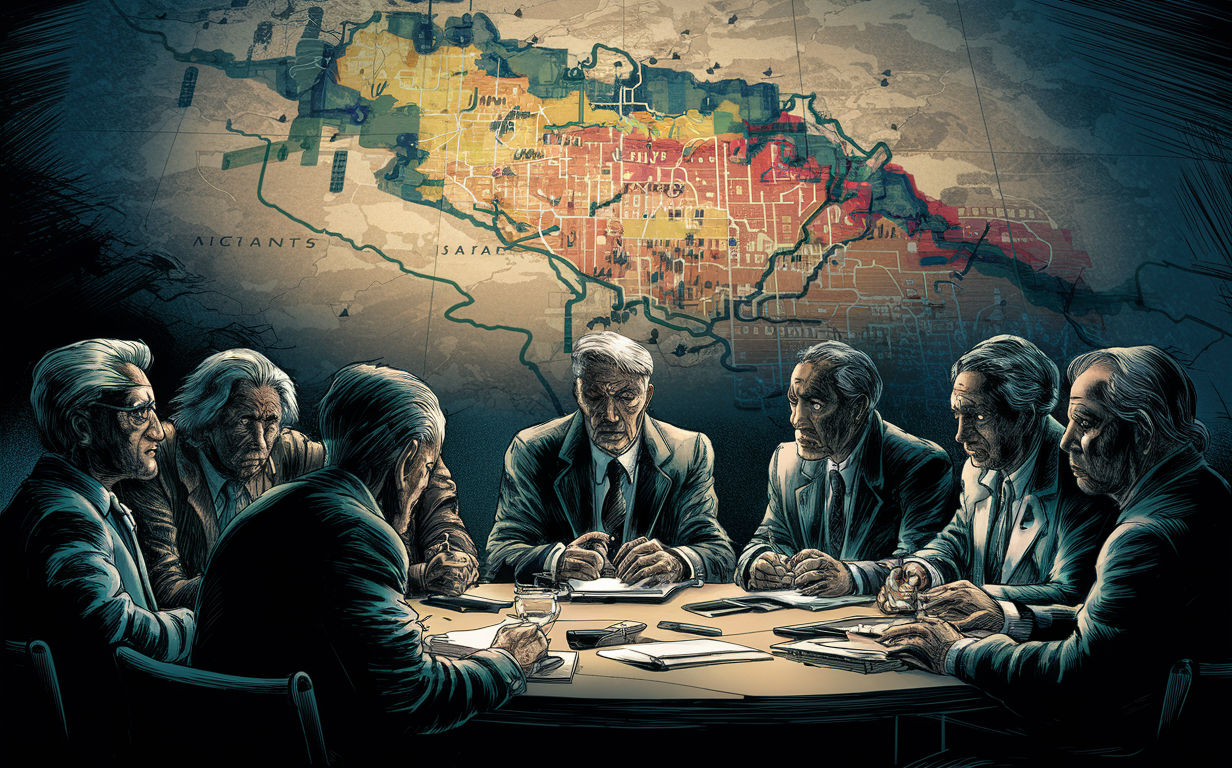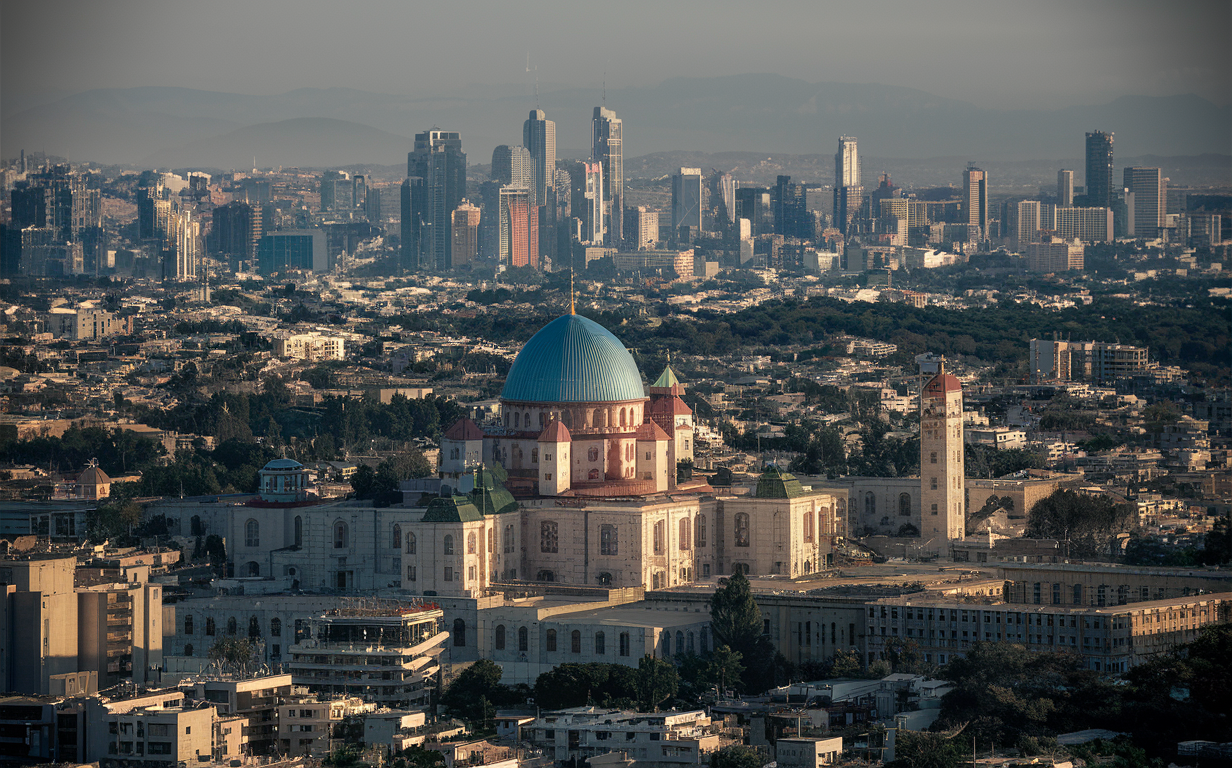Israel
Netanyahu’s Grip on Power Tightens, But Whispers of Dissent Grow Louder

Jerusalem – Prime Minister Benjamin Netanyahu, the longest-serving leader in Israeli history, has weathered countless storms. From corruption scandals to international crises, he has clung to power with a tenacity that borders on defiance. But in recent months, a new chorus of discontent has begun to reverberate through the halls of the Knesset, the Israeli parliament. Leading the charge is MK Meirav Cohen, a rising star in the Labor Party, who has declared Netanyahu a “millstone around Israel’s neck” and called for his dismissal.

A Mounting List of Grievances
Cohen’s scathing critique stems from a confluence of factors. The ongoing corruption trial against Netanyahu, in which he faces charges of bribery, fraud, and breach of trust, has cast a long shadow over his administration. His handling of the COVID-19 pandemic, marked by inconsistent policies and rising case numbers, has eroded public trust. And his controversial policies towards the Palestinians, including the expansion of settlements in the occupied territories, have further alienated segments of the Israeli population.
Dissension Within the Ranks
Cohen is not alone in her concerns. Even within Netanyahu’s own Likud party, cracks are beginning to appear. Several prominent members have expressed disappointment with his leadership, with some even hinting at potential support for alternative candidates in the next election. This internal dissent, though still muted, signifies a shift in the political landscape that could challenge Netanyahu’s seemingly unshakeable position.
Cohen’s Call to Action
In a fiery speech on the Knesset floor, Cohen issued a direct challenge to Netanyahu. “He has failed us on every front,” she declared. “From the economy to security, from healthcare to education, he has offered only empty promises and broken dreams. It is time for us to cast off this millstone and forge a new path forward.”
Netanyahu’s Defiance and the Road Ahead
Netanyahu, unsurprisingly, has dismissed Cohen’s accusations as politically motivated. He has pointed to Israel’s strong economic performance under his leadership, its recent normalization agreements with Arab countries, and its decisive military response to threats from Hamas and Hezbollah. He remains defiant, confident in his ability to weather the storm and secure another term in office.
However, the tide may be turning. The public mood in Israel is increasingly restless, and Netanyahu’s once Teflon-coated image shows signs of wear. Cohen’s outspoken criticism, while not yet a mainstream sentiment, represents a growing dissatisfaction with the status quo. Whether it will be enough to dislodge Netanyahu from power remains to be seen. But one thing is clear: the winds of change are blowing through Israeli politics, and Netanyahu’s grip on power, once thought unassailable, is finally starting to loosen.
The Human Cost of Political Stalemate
Behind the political intrigue lies a human story. Israelis from all walks of life are feeling the pinch of economic hardship, the weight of insecurity, and the frustration of a seemingly endless conflict. Cohen’s call for a new path forward resonates with many who yearn for stability, prosperity, and a just resolution to the Palestinian issue.
Uncertain Future, Hopeful Glimmer
The future of Israel under Netanyahu remains uncertain. His dismissal appears unlikely in the immediate future, but the cracks in his armour are widening. Cohen’s voice, and the voices of others like her, represent a flicker of hope for a different kind of leadership, one that can unite the country and navigate the complex challenges it faces. Whether this hope blossoms into reality remains to be seen, but the growing dissent within Israel presents a critical moment of reckoning. One thing is certain: the story of Israel in the years to come will be shaped by the choices its people make in the face of this mounting discontent.
Analysis
Unraveling the Political Turmoil: The Call for Change in Israel – Analysis of Netanyahu’s Leadership Amidst International Pressure”

Table of Contents
Introduction:
In recent times, the political landscape in Israel has been tumultuous, with growing international pressure on Prime Minister Binyamin Netanyahu to step down. This article delves into the complexities surrounding this situation, examining the implications of America’s stance, the criticisms faced by Netanyahu, and the potential risks and opportunities associated with his exit.
America’s Push for Change:
The rift between Israel and America has widened, particularly concerning Israel’s handling of civilian provisions in Gaza. Key figures like Chuck Schumer and Joe Biden have openly criticized Netanyahu, calling for early elections. Explore the significance of America’s influence on Israeli politics and the implications of their support for a leadership change.
Netanyahu’s Leadership Under Scrutiny:
Analyze the accusations leveled against Binyamin Netanyahu, focusing on his alleged tolerance of civilian casualties in Gaza and its impact on global perceptions of Israel. Examine how these criticisms have affected his standing both domestically and internationally.
The Dangers of Transition:
Discuss the potential risks involved in Netanyahu’s departure, considering factors such as political instability, security concerns, and the implications for Israel’s foreign relations. Evaluate the challenges that may arise during a leadership transition and how they could impact the country’s future.
Opportunities for Change:
Highlight the opportunities that a change in leadership could bring to Israel, including potential shifts in policies, diplomatic relations, and public perception. Explore how a new leader could navigate the current challenges facing the nation and work towards rebuilding international support.
Conclusion:
In conclusion, the call for Binyamin Netanyahu to step down reflects a critical juncture in Israeli politics, with far-reaching implications for both domestic governance and international relations. As the pressure mounts for change, it remains to be seen how Israel will navigate this period of uncertainty and what lies ahead for its leadership and people.
Analysis
UN Failure to Contain Israel: The Way Forward on War Crimes and Genocide in Gaza

The conflict between Israel and Palestine has been ongoing for decades, with numerous attempts at peace negotiations and ceasefires failing to bring lasting resolution. In recent years, the situation in Gaza has escalated, with Israel being accused of committing war crimes and genocide against the Palestinian people. Despite the efforts of the United Nations (UN) to address these allegations, Israel has continued its military operations in the region, leading to the loss of countless lives and the displacement of thousands of civilians.

The failure of the UN to contain Israel’s actions in Gaza has raised questions about the organization’s effectiveness in dealing with conflicts and protecting civilian populations. While the UN has condemned Israel’s actions and called for an end to the violence, it has been unable to enforce its resolutions or hold Israel accountable for its actions. This has led to criticism from many quarters, with some accusing the UN of being biased in favour of Israel and failing to fulfil its mandate to protect human rights.
Despite the challenges, there are still opportunities for the UN to play a more effective role in addressing the conflict in Gaza and holding Israel accountable for its actions. By working with regional partners and engaging in diplomatic efforts, the UN can help to de-escalate tensions and promote a peaceful resolution to the conflict. However, this will require a concerted effort from all parties involved and a willingness to put aside political differences in the interest of the greater good.
Table of Contents
Key Takeaways
- The conflict between Israel and Palestine has escalated in recent years, with Israel being accused of committing war crimes and genocide against the Palestinian people.
- The UN has been criticized for its failure to contain Israel’s actions in Gaza and enforce its resolutions.
- Despite the challenges, there are still opportunities for the UN to play a more effective role in addressing the conflict in Gaza and promoting a peaceful resolution.
Historical Context of the Israel-Gaza Conflict

Roots of the Conflict
The Israel-Gaza conflict has its roots in the displacement of Palestinians from their homes during the creation of the state of Israel in 1948. This displacement, also known as the Nakba, resulted in the loss of homes, land, and livelihoods for over 700,000 Palestinians. Since then, the conflict has been characterized by a series of wars, military operations, and violent clashes between Israel and the Palestinian territories of Gaza and the West Bank.
The conflict escalated in 2007 when the militant group Hamas seized control of Gaza, leading to a blockade by Israel that has severely restricted the movement of people and goods in and out of the territory. The blockade has had a devastating impact on the economy and infrastructure of Gaza, which is one of the most densely populated areas in the world.
UN Interventions and Resolutions
The United Nations has played a significant role in attempting to resolve the Israel-Gaza conflict, but its efforts have been largely unsuccessful. In 1947, the UN partitioned Palestine into two states, one Jewish and one Arab, but the plan was rejected by the Arab states and led to the first Arab-Israeli war.
Since then, the UN has passed numerous resolutions condemning Israeli actions in the occupied territories and calling for an end to the conflict. However, these resolutions have been largely ignored by Israel and have not led to any significant change on the ground.
In recent years, the UN has attempted to broker a ceasefire between Israel and Hamas, but these efforts have also been unsuccessful. The UN has also called for an end to the blockade of Gaza, but Israel has refused to lift the restrictions.
Overall, the failure of the UN to contain Israel from committing war crimes and genocide in Gaza has been a major source of frustration and disappointment for those seeking a peaceful resolution to the conflict.
Analysis of UN Efforts to Address War Crimes Allegations

The United Nations (UN) has made several attempts to address war crimes allegations against Israel in Gaza. This section analyzes the UN’s efforts and highlights the challenges in international law enforcement.
UN Fact-Finding Missions in Gaza
The UN has conducted several fact-finding missions in Gaza to investigate allegations of war crimes and genocide committed by Israel. In 2009, the UN established the Goldstone Commission to investigate the 2008-2009 Gaza conflict. The commission found evidence of war crimes and crimes against humanity committed by both Israel and Hamas. However, Israel refused to cooperate with the commission, and the report was later retracted by its author, Richard Goldstone.
In 2014, the UN established another commission to investigate the 2014 Gaza conflict. The commission found evidence of war crimes and crimes against humanity committed by Israel and Hamas. However, Israel again refused to cooperate with the commission, and the report was met with strong opposition from Israel and its allies.
Challenges in International Law Enforcement
One of the major challenges in international law enforcement is the lack of enforcement mechanisms. The UN has no authority to enforce its decisions, and the International Criminal Court (ICC) can only prosecute individuals, not states. This means that even if the UN or the ICC finds evidence of war crimes or genocide committed by Israel, they cannot compel Israel to comply with their decisions.
Another challenge is the politicization of international law. Israel and its allies have accused the UN and the ICC of bias against Israel, and have used their political influence to undermine the credibility of these institutions. This has made it difficult for the UN and the ICC to conduct impartial investigations and prosecute war crimes and genocide.
In conclusion, the UN has made several attempts to address war crimes allegations against Israel in Gaza but has faced significant challenges in international law enforcement. The lack of enforcement mechanisms and the politicization of international law have made it difficult for the UN and the ICC to prosecute war crimes and genocide.
The Way Forward

Proposed Strategies for Conflict Resolution
The first step towards resolving the conflict between Israel and Gaza is to establish a ceasefire agreement that is respected by both parties. The UN Security Council should take a more active role in mediating this agreement and ensure that it is implemented effectively. The ceasefire should be monitored by a neutral third party to ensure that both sides adhere to the terms of the agreement.
Another proposed strategy is to engage in diplomatic efforts to bring both sides to the negotiating table. The UN should work with regional powers such as Egypt, Jordan, and Saudi Arabia to facilitate these talks. The negotiations should focus on addressing the root causes of the conflict, including the status of Jerusalem, the right of return for Palestinian refugees, and the establishment of a Palestinian state.
Strengthening International Accountability Mechanisms
The UN should also take steps to strengthen international accountability mechanisms to hold Israel accountable for its actions in Gaza. This could include the establishment of an independent commission of inquiry to investigate allegations of war crimes and genocide committed by Israel in Gaza. The commission should be given the power to subpoena witnesses and collect evidence to ensure a thorough investigation.
In addition, the UN should consider imposing economic sanctions on Israel to pressure it to comply with international law. The UN General Assembly should also consider referring the situation in Gaza to the International Criminal Court (ICC) for investigation and prosecution of war crimes and genocide.
Overall, the international community should take a more active role in resolving the conflict between Israel and Gaza. The UN should work to establish a lasting ceasefire agreement and engage in diplomatic efforts to address the root causes of the conflict. Additionally, the UN should strengthen international accountability mechanisms to hold Israel accountable for its actions in Gaza. By taking these steps, the international community can work towards lasting peace in the region.
Frequently Asked Questions

What measures has the UN taken to address allegations of war crimes in Gaza?
The UN has established several fact-finding missions to investigate allegations of war crimes committed by Israel in Gaza. However, these missions have been criticized for their lack of effectiveness due to Israel’s refusal to cooperate with them. Additionally, the UN has passed several resolutions condemning Israel’s actions in Gaza, but these have largely been ignored by Israel.
How has the International Court of Justice responded to the situation in Gaza?
The International Court of Justice has issued several advisory opinions regarding the Israel-Palestine conflict, but it has not taken any concrete action to hold Israel accountable for its actions in Gaza. This is largely because Israel is not a party to the court’s jurisdiction.
What are the limitations of the UN in enforcing resolutions against member states?
The UN has limited enforcement mechanisms when it comes to member states that violate its resolutions. The UN can impose economic sanctions, but these are often ineffective and can harm innocent civilians. The UN can also authorize military action, but this is a last resort and requires the approval of the UN Security Council.
What role does the UN Security Council play in the Israel-Palestine conflict?
The UN Security Council has the power to impose sanctions and authorize military action, but its effectiveness is limited by the fact that the United States, a close ally of Israel, has veto power. This has often resulted in the Security Council being unable to pass resolutions that are critical of Israel.
How many resolutions concerning Israel and Palestine has the UN passed, and what has been their impact?
The UN has passed numerous resolutions concerning Israel and Palestine, but their impact has been limited due to Israel’s refusal to comply with them. Many of these resolutions have been critical of Israel’s actions in Gaza and have called for an end to the occupation of Palestinian territories, but they have largely been ignored by Israel.
What are the proposed steps for the UN to improve its effectiveness in conflict resolution in the Israel-Palestine situation?
Proposed steps for the UN to improve its effectiveness in conflict resolution in the Israel-Palestine situation include increasing pressure on Israel to comply with UN resolutions, improving the effectiveness of fact-finding missions, and finding ways to hold Israel accountable for its actions in Gaza. Additionally, the UN could work with other international organizations to develop a comprehensive peace plan for the region.
Israel
UN Report on Israeli Restrictions on Gaza Food Aid

Introduction
Gaza, a territory beset by persistent tensions and humanitarian crises, stands at the centre of the Israeli-Palestinian conflict. As hunger levels rise, a UN study that just came to light on Israeli limitations on food supply to Gaza raised worries about possible war crimes and emphasized the crises’ human-made nature.
Table of Contents
Background Information
The historical backdrop of the Israeli-Palestinian conflict sets the stage for understanding the complexities of the situation in Gaza. The blockade imposed on Gaza has severely impacted its economy and food security, exacerbating the challenges faced by its population. Previous reports and actions have highlighted the dire humanitarian situation in Gaza.
UN Report Findings
The UN report outlined key findings regarding Israeli restrictions on food aid to Gaza, suggesting that these actions may constitute a war crime. The High Commissioner for Human Rights emphasized the man-made nature of the crisis and expressed deep concern over the worsening hunger levels in Gaza.
Humanitarian Crisis in Gaza
As hunger levels continue to rise in Gaza, the population, especially children and vulnerable groups, faces severe food insecurity. The blockade has compounded existing challenges, making it difficult for humanitarian organizations to provide essential aid to those in need.
International Response and Calls for Action
The UN report has sparked international reactions, with calls for accountability and justice for violations of human rights in Gaza. Efforts are underway to address the humanitarian crisis and alleviate the suffering of the Gazan population through coordinated humanitarian interventions.
Conclusion
The situation in Gaza demands urgent attention and action from the international community. As Israeli restrictions on food aid raise concerns of potential war crimes, it is crucial to address the root causes of the crisis and work towards sustainable solutions that prioritize human rights and dignity. Readers are encouraged to support humanitarian efforts in Gaza and advocate for lasting peace in the region.
-

 Featured3 years ago
Featured3 years agoThe Right-Wing Politics in United States & The Capitol Hill Mayhem
-

 News3 years ago
News3 years agoPrioritizing health & education most effective way to improve socio-economic status: President
-

 China3 years ago
China3 years agoCoronavirus Pandemic and Global Response
-

 Canada3 years ago
Canada3 years agoSocio-Economic Implications of Canadian Border Closure With U.S
-

 Conflict3 years ago
Conflict3 years agoKashmir Lockdown, UNGA & Thereafter
-

 Democracy3 years ago
Democracy3 years agoMissing You! SPSC
-

 Democracy3 years ago
Democracy3 years agoPresident Dr Arif Alvi Confers Civil Awards on Independence Day
-

 Digital4 years ago
Digital4 years agoPakistan Moves Closer to Train One Million Youth with Digital Skills
















